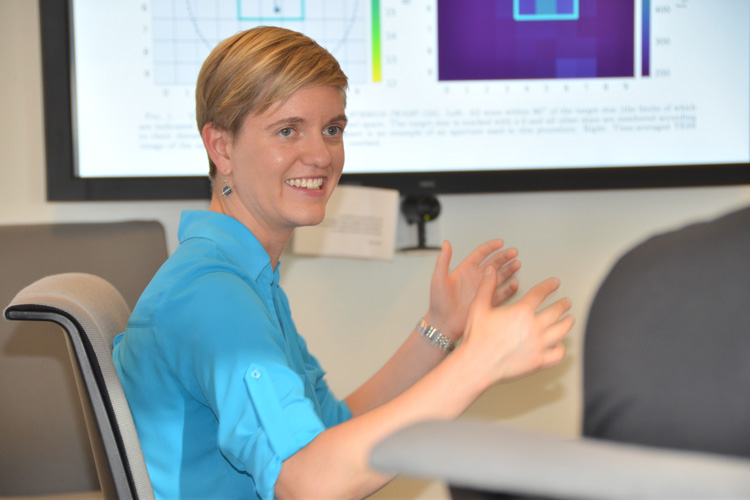Courtney Dressing’s ongoing search for planets around other stars has won her a prestigious Packard Fellowship in Science and Engineering.
Dressing, a UC Berkeley assistant professor of astronomy, is one of 22 early career scientists and engineers nationwide who will receive $875,000 each over five years to pursue their research. The new fellows were announced this week by the David and Lucile Packard Foundation.
The Packard Fellowships in Science and Engineering are among the nation’s largest nongovernmental fellowships, designed to allow maximum flexibility in how the funding is used. Since 1988, this program has supported the blue sky thinking of scientists and engineers, with the belief that their research, over time, will lead to new discoveries that improve people’s lives and enhance our understanding of the universe.
“This new class of fellows is about to embark on a journey to pursue their curiosity down unknown paths in ways that could lead to big discoveries,” said Frances Arnold, who is chair of the Packard Fellowships Advisory Panel and a 2018 Nobel laureate in chemistry, Berkeley alumna and 1989 Packard Fellow. “I can’t wait to see what direction the work of these brilliant scientists and engineers will take. Their efforts will add to this beautiful web of science that connects us all to a better understanding of the world around us.”
Dressing came to Berkeley’s astronomy department in 2017 after a postdoctoral fellowship at Caltech. She obtained her Ph.D. in astronomy from Harvard University in 2015, working with well-known exoplanet astronomer and 2006 Packard Fellow David Charbonneau.
Her Berkeley research group is advancing the search for life on planets orbiting nearby stars by using a variety of ground-based and space-based telescopes to discover new planets, determine their characteristics and assess their suitability for life. The NASA Kepler Mission has previously revealed that planetary systems are common, but astronomers are still working to determine which planets might be able to support life. Dressing hopes to answer such questions as, “Where are the nearest planets?” and “Which planets are rocky, like Earth?”
Another key question is how the activity of a star and the intensity of radiation from that star, affects planets and makes them suitable or unsuitable for life.
“Receiving a Packard Fellowship is a remarkable opportunity to conduct an in-depth investigation of our nearest stellar neighbors, detect new planetary systems and determine which planets are most amenable to life,” Dressing said. “I feel extremely grateful to the foundation for supporting my research program, and I’m excited to work with my students to undertake a comprehensive study of planetary habitability.”
The fellowship program was inspired by David Packard’s commitment to strengthen university-based science and engineering programs in the United States. He recognized that the success of Hewlett-Packard, the information technology company he co-founded, was derived, in large measure, from research and development in university laboratories. Since 1988, the foundation has awarded $429 million to support 617 scientists and engineers from 54 national universities. This year’s fellowships are also supported, in part, by the Ross M. Brown Family Foundation.
